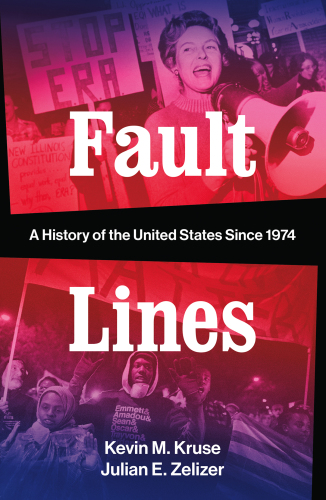
Fault Lines
A History of the United States Since 1974
کتاب های مرتبط
- اطلاعات
- نقد و بررسی
- دیدگاه کاربران
نقد و بررسی

November 15, 2018
Two Princeton professors add to the burgeoning literature about a fractured America, based largely on their university lectures on the subject.Kruse (One Nation Under God: How Corporate America Invented Christian America, 2015, etc.) and Zelizer (The Fierce Urgency of Now: Lyndon Johnson, Congress, and the Battle for the Great Society, 2015, etc.) organize their history around four principal fault lines: growing economic inequality, racial division, partisan polarization, and conflicts regarding gender and sexuality. In a clear, lively style, Kruse and Zelizer show how developments in these areas have divided the nation and made compromises for the common good more difficult. In coverage of the earlier years, the authors evenly distribute responsibility for the worsening conflicts. However, beginning with the genesis of the Obama administration, the narrative takes on an increasingly leftist slant as the authors minimize or omit the left's contributions to the widening divide, creating the impression that it was largely conservatives who were perpetuating an atmosphere of obstructionism and division. Conspicuously absent, for example, is any mention of intolerance and violence directed at conservative speakers on college campuses or of antifa thuggery generally. Alongside political and social divisions, the authors chronicle the fragmentation of American media, with three major TV networks and relatively sober newspapers of national stature replaced by cable TV, talk radio, and an infinite number of commentators on internet blogs and social media. As is well-known, this multiplicity of sources has led not to a better informed public but to the creation of partisan echo chambers that disagree even about fundamental facts, let alone their interpretation. The authors posit no overarching theories of how all this came about, nor do they offer a path forward to a better place. In discouraging detail, they lay out how short-sighted decisions and inflexible partisanship have placed a consensus on national identity and goals so far out of reach.A left-leaning but readable, comprehensive history of the political and cultural trends that continue to erode any sense of American national unity.
COPYRIGHT(2018) Kirkus Reviews, ALL RIGHTS RESERVED.

December 1, 2018
Based on a college class Kruse and Zelizer (both history, Princeton Univ.) cocreated, this book is a concise, riveting, and carefully argued chronicle of the last four decades of American history, from Watergate through President Donald Trump's first year in office, with the September 11 attacks as a pivotal moment. Many of the recent events described throughout have both a vague familiarity and, in the authors' expert hands, a surprising newness. The book draws its structure and title from four dividing lines in American society: politics, economy, race, gender, and sexuality. Making judicious use of primary and secondary sources, the authors argue persuasively that changes in the way Americans communicate and receive news, along with other broad trends, have made those divisions more pronounced and deep seated. Kruse and Zelizer effectively summarize massive social movements and developments--e.g., the rise of the religious right or the growth of social media--in a few pages. They rightly dwell at more length on the historic 2016 presidential election and its aftermath. VERDICT This highly readable, compelling book should be required reading for all Americans of voting age.--Christopher Myers, Lake Oswego P.L., OR
Copyright 2018 Library Journal, LLC Used with permission.

January 1, 2019
This is a book for those who wonder, to quote new wave pioneers, the Talking Heads, "Well, how did I get here?" Kruse (One Nation Under God, 2015) and Zelizer (The Fierce Urgency of Now, 2015) trace the path from Watergate to MAGA, mix together big-picture political history, socioeconomic shifts, and technological transformations, with a leavening of pop culture. They emphasize the cycle of increasing fragmentation that, beginning with the upheavals of the late 1960s and early 1970s, has reinforced America's underlying political, economic, and sociocultural divisions. Politics became ever more polarized, attempts to rebuild national consensus were thwarted (if this book has a villain it's the Supreme Court, which usually pops up to declare such innovations unconstitutional), and increasing economic insecurity and media fragmentation fueled the fire. Their survey constitutes a valuable road map for readers seeking to understand why the U.S. is the way it is and ends with the hopeful message that the wear-and-tear inflicted on the country has inspired new institutions before and may do so again.(Reprinted with permission of Booklist, copyright 2019, American Library Association.)

























دیدگاه کاربران